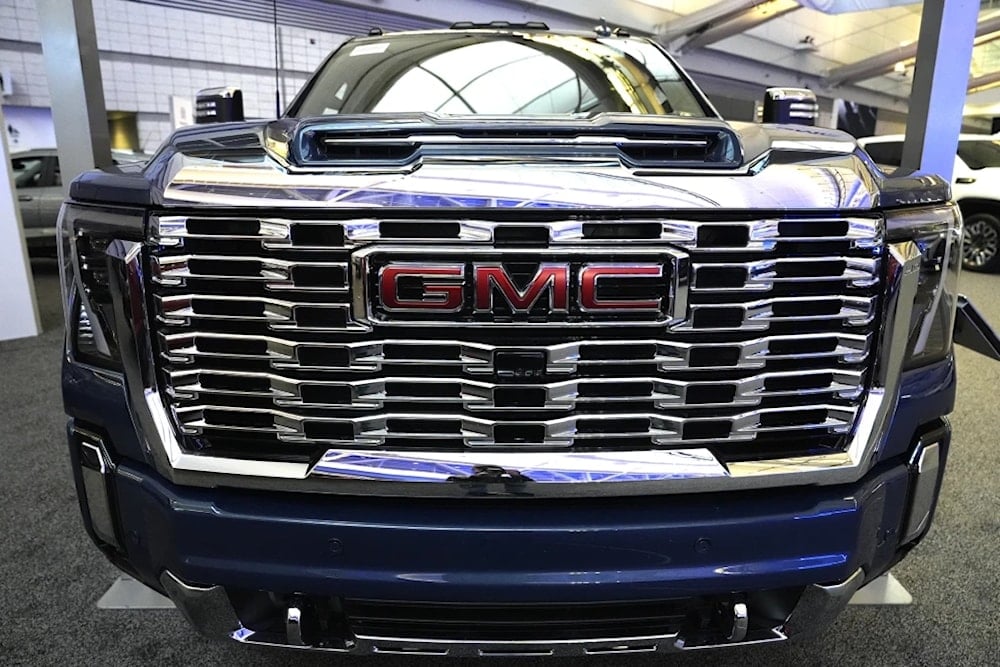Trump to reduce impact of auto tariffs, US commerce secretary says
Amid supply chain warnings from automakers, the Trump administration has moved to ease auto tariffs by reimbursing duties and preventing overlapping levies.
-

A grill on a GMC Sierra Heavy Duty Denali HD 2500 truck on display at the Pittsburgh International Auto Show in Pittsburgh, Feb. 15, 2024 (AP)
The Trump administration will ease auto tariffs on Tuesday by reducing duties on foreign parts used in US-made cars and preventing overlapping tariffs on imported vehicles, officials said.
"President Trump is building an important partnership with both the domestic automakers and our great American workers," Commerce Secretary Howard Lutnick said in a statement provided by the White House.
"This deal is a major victory for the President's trade policy by rewarding companies who manufacture domestically while providing runway to manufacturers who have expressed their commitment to invest in America and expand their domestic manufacturing.”
The Wall Street Journal reported that automakers paying tariffs won’t face additional levies like those on steel and aluminum and will be reimbursed for any already paid.
Automakers expected tariff relief ahead of Trump’s Michigan trip, home to the Detroit Three and over 1,000 key auto suppliers.
GM CEO Mary Barra and Ford CEO Jim Farley praised the move. "We believe the president’s leadership is helping level the playing field for companies like GM and allowing us to invest even more in the US economy," Barra said.
The tariff relief reflects growing flexibility amid market turmoil and economic uncertainty caused by the administration’s trade policies.
Impact of tariffs on automakers, suppliers and consumers diminishes
Farley said the changes "will help mitigate the impact of tariffs on automakers, suppliers and consumers." Last week, US auto groups urged Trump to drop plans for 25% tariffs on imported parts, warning of higher prices and lower sales. Trump had previously said he would impose the tariffs by May 3.
"Tariffs on auto parts will scramble the global automotive supply chain and set off a domino effect that will lead to higher auto prices for consumers, lower sales at dealerships and will make servicing and repairing vehicles both more expensive and less predictable," the industry groups said in the letter.
The letter, signed by groups representing GM, Toyota, Volkswagen, Hyundai, and others, was sent to US Trade Representative Jamieson Greer, Treasury Secretary Scott Bessent, and Commerce's Lutnick.
"Most auto suppliers are not capitalized for an abrupt tariff-induced disruption. Many are already in distress and will face production stoppages, layoffs and bankruptcy," the letter added, noting that "it only takes the failure of one supplier to lead to a shutdown of an automaker's production line."
The impact
Trump had argued that the tariffs will lead to more US factory openings, but industry leaders warn that uncertainty and rising costs could disrupt production planning and profitability.
Last month, the Associated Press (AP) reported that shares of major automakers fell sharply following Trump’s announcement of 25% tariffs on auto imports, which took effect on April 3. If the tariffs persist, they are expected to significantly increase production costs for companies that rely on international supply chains, as parts and assembly processes often cross multiple borders within North America.
General Motors, which sources about 40% of its US vehicle sales from Mexico and Canada, saw its shares drop at the time to 7.4%, with analysts suggesting it could be among the hardest hit. Ford, with a smaller share of non-US production, had slipped 3.9%, while Honda and Toyota’s US-traded shares had dropped 2.2% and 2.5% respectively.
Auto parts suppliers had also taken a hit: Autoliv declined 3.5%, Aptiv 5.4%, Gentex 3.6%, and Lear 8.3%. Industry analysts and economists voiced concern that the tariffs could fuel inflation, which has already been driven up by record-high car prices and rising costs for insurance and repairs. As of February, the average new vehicle price stood at $48,039, just shy of the late 2022 record.
At the time, GM CFO Paul A. Jacobson said the company is weighing long-term plant allocation and investment decisions in case the tariffs become permanent.

 4 Min Read
4 Min Read








